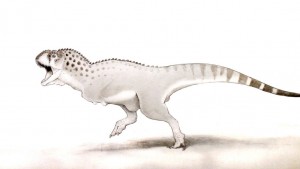Sky News
An artist’s impression of the Chenanisaurus barbaricus
Scientists have discovered one of the last dinosaurs living in Africa before they became extinct 66 million years ago.
The Chenanisaurus barbaricus is extremely rare and is a smaller African contemporary of the North American T rex.
A rare fragment of a jaw bone was studied by Dr Nick Longrich at the University of Bath after it was found in a phosphate mine at Sidi Chennane in the Oulad Abdoun Basin, Morocco.
Dr Longrich, in collaboration with colleagues in Morocco, France and Spain, identified it as belonging to an abelisaur – which was a two-legged predator like T rex and other tyrannosaurs, but had a shorter, blunter snout and even smaller arms.
The tyrannosaurs dominated in North America and Asia, but the abelisaurs were the top predators at the end of the Cretaceous period in Africa, South America, India and Europe.
Dr Longrich told Sky News: “This find was unusual because it’s a dinosaur from marine rocks – it’s a bit like hunting for fossil whales and finding a fossil lion.
“It’s an incredibly rare find – almost like winning the lottery. But the phosphate mines are so rich, it’s like buying a million lottery tickets, so we actually have a chance to find rare dinosaurs like this one.
“We have virtually no dinosaur fossils from this time period in Morocco – it may even be the first dinosaur named from the end-Cretaceous in Africa.
“It’s also one of the last dinosaurs in Africa before the mass extinction that wiped out the dinosaurs.
“It’s an exciting find because it shows just how different the fauna was in the southern hemisphere at this time.”
The newly-discovered dinosaur stood on two legs and had stumpy arms, say scientists.
Dr Longrich said: “Abelisaurs had very short arms. The upper arm bone is short, the lower arm is shorter and they have tiny little hands.”
Scientists say the teeth from the fossil were worn as if from biting into bone, suggesting that, like T rex, Chenanisaurus was a predator.
Dr Longrich added: “The odd thing is it’s a terrestrial animal found in marine rocks. It was possibly drowned and washed out to sea and was floating in the ocean.”








